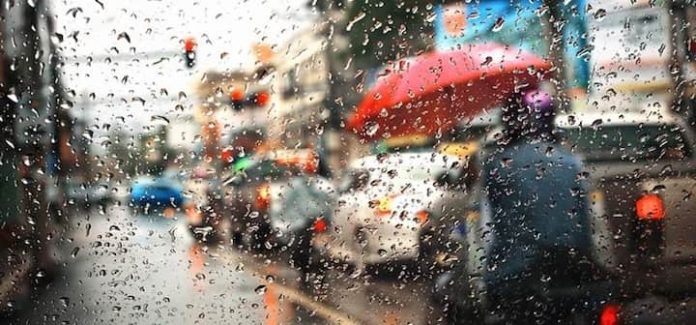April to October is always characterized by torrential rainfall in this part of the world, so it’s no surprise that the rains are here.
While the season heralds a more favorable weather condition as the switch from the harsh heat to a cooler temperature counts as a major positive, it also comes with its baggage of downsides.
Consistent rainfall in a situation with poor drainage systems means the ground gets more water than it can absorb at a time. This excess water is left to run free on the ground or retained in any available pocket of space on the earth – a perfect environment for mosquitoes and other disease-causing parasites to breed.
Apart from this, there are many other diseases and health challenges peculiar to the rainy season as itemized below:
Malaria
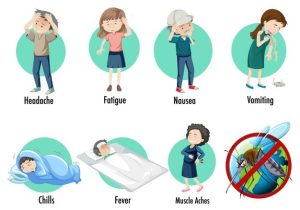
This is probably the most common disease peculiar to the rainy season. Mosquitoes take advantage of swamps, wetlands, drainages, and any other available pockets of water reserves to breed and multiply. It is an open secret that malaria is transmitted via a bite from the female mosquito.
The effects of malaria infections can range from mild to severe or mortal. According to facts from severemalaria.org, Nigeria accounted for the highest number of malaria cases in the world in 2021 – 27%, and also the most deaths – 32%.
The following are helpful tips that can keep you safe from mosquito bites and malaria.
• Ensure gutters, canals, and all water passageways are cleared to allow proper drainage of water when the rain comes
• Clean and disinfect drainage systems to kill and eradicate possible breeding parasites
• Fumigate the environment or surroundings for a malaria-free zone
• Fortify windows and doorways with insecticide-treated nets and always ensure to sleep under one
• Always seek medical help early when feeling feverish or unwell.
Flu and common cold

Because of the similarities in symptoms between flu and common cold, most people get it all mixed and muddled up. While flu is caused mainly by the influenza virus, common cold can be caused by several viruses, like rhinoviruses, parainfluenza, etc.
The drop in weather conditions that comes with the rainy season opens up the body to respiratory infections with effects like coughs, runny nose, sneezing, and sore-throats, possible symptoms. They can also come with body and joint pains, headaches, and fits of fever.
To keep your respiratory tract infection-free during the rainy season;
• Always stay clothed and covered up during the rainy season to avoid the cold getting into the chest and other vulnerable body parts
• Stay off cold drinks and drink lots of warm water to clear your airways.
• Wash hands with soap and water always or use an alcohol-based hand wash
• Avoid touching your eyes, nose, and mouth, to avoid passing on germs from your hands into your system
• Get vaccinated every year.
Typhoid
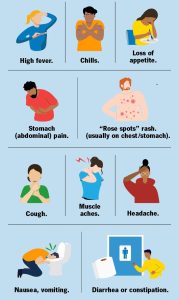
Another major disease common with the rainy season is typhoid fever which is spread by the Salmonella typhi bacterium. This disease is passed on to a healthy host from taking in food or water that is contaminated by the S.typhi bacteria.
Weak drainage and human waste disposal system make it easy for excess water during the rainy season to penetrate and wash out urine and fecal contents onto the earth’s surface where they can easily find their way into wells, streams, rivers, and other useful water reserves. This opens us users to Typhoid infections.
The following precautions can be taken to avoid getting infected by the salmonella bacteria.
• Always wash your hands with soap and running water after using the toilet and before cooking
• Only drink healthy and purified water
• Ensure to heat your food before eating them to kill off possible inherent bacteria.
• Wash fruits thoroughly before eating to get rid of possible parasites
Cholera
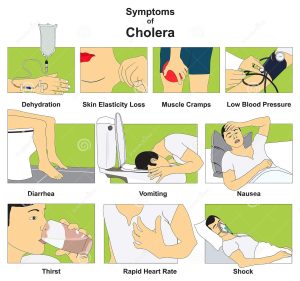
Cholera is another bacterial infection that thrives during the rainy season. This disease is spread when persons come in contact with contaminated water and are more prevalent in areas where people depend on wells, streams, and rivers for water supply.
The impact of this disease can be very fatal as it affects the intestinal tract and rid it of its ability to retain fluids. This causes dehydration and can lead to death in as little as 24 hours if medical care is not gotten.
To be safe from cholera outbreaks, the following tips can be helpful.
• Drink only treated and purified water to avoid getting infected
• Always wash hands regularly with soap and water
• Treat water source with chlorine
• Take care of your drinking water store and ensure its kept clean and covered always
• Ensure sea foods thoroughly boiled before eating to kill off possible parasites
• Get vaccinated
Diarrhea
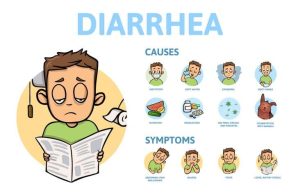
Water contamination is perhaps the biggest downside of the rainy season, and since water is needed to cook and stay hydrated, diarrhea and other intestinal tract infections get rampant during this season.
The following tips can help prevent diarrhea and other gut infection.
• Always wash your hands thoroughly before cooking or eating
• Drink only purified water to avoid ingesting parasites
• Ensure to heat food before eating to kill off possible parasites
• Wash and peel off fruits before eating
• Keep drainages and surroundings clean
Conclusion
The rain has started falling, and, as they say, prevention is better than cure. So, take precautions and, when necessary, see your doctor.

